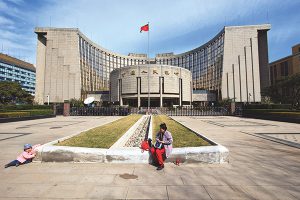Bloomberg
China’s credit growth recovered in August from a record low after the central bank cut rates and pushed banks to lend more, although still anemic household borrowing and the return of shadow banking suggest that real demand for loans is still not strong.
Aggregate financing to the economy, which is a broad measure of new credit, was triple the record low in July, boosted by growth in new loans and lending through shadow banking, according to data released by the People’s Bank of China.
The return of shadow banking and the fact that the stock of outstanding credit again grew at a slower pace than M2, the broadest measure of money supply, suggest that some of the liquidity in the financial system isn’t making it to the real economy.
The diverging trends for money supply and outstanding credit indicate that the support from monetary easing to lending may weaken and adds to concerns about a so-called
“liquidity trap.â€
The government and central bank have been trying to support the housing and construction industries with rate cuts, more bonds and other measures, but there’s no sign so far that those actions are sufficient to turn around the downward momentum of an economy battered by a property crisis or lockdowns and restrictions to contain Covid.
“Private sector demand for loans is falling, but so much liquidity has been pumped in that it is starting to leak out into a shadow finance sector which, until earlier this year, had been shrinking faster and faster,†Craig Botham, chief China economist at Pantheon Macroeconomics, wrote in a note. Corporate and government bond sales slowed, while mortgages were weak despite the rate cuts, he wrote.
Shadow banking jumped by almost 480 billion yuan last month, the biggest increase since March 2017, as bankers’ acceptances and entrusted loans rose.
The government stepped up monetary easing measures recently to help the struggling economy as credit growth was sluggish, but companies and households have been reluctant to take on much more debt as the economy slows.
Last month the PBOC unexpectedly cut policy interest rates, leading to a 15-basis point reduction in the five-year loan prime rate, a reference rate for mortgages.
Beijing also recently rolled out a stimulus package with 1 trillion yuan in funding mostly for infrastructure projects, and policy banks were told to offer 200 billion yuan in special loans to ensure stalled housing projects are delivered to buyers, according to Bloomberg reporting.
 The Gulf Time Newspaper One of the finest business newspapers in the UAE brought to you by our professional writers and editors.
The Gulf Time Newspaper One of the finest business newspapers in the UAE brought to you by our professional writers and editors.
